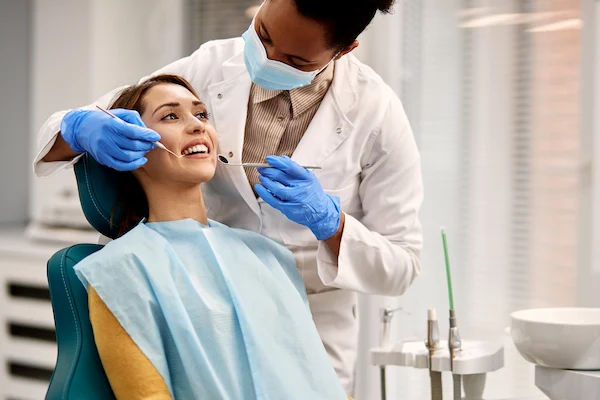Your Complete Guide to Dental Care: Tips for a Healthy Smile
Learn about the relationship between dental care and oral systemic health, the role of finances in preventive care, home dental care routines, and more.


Introduction
A radiant smile is a universal sign of health and confidence, but achieving and maintaining it requires more than just occasional brushing. Comprehensive dental care is the cornerstone of not only oral health but also your overall well-being. From preventing painful cavities to understanding the surprising link between your gums and heart health, a proactive approach to dentistry can save you from discomfort, complex procedures, and significant expense down the line. This guide is designed to be your ultimate resource, moving beyond basic advice to provide a comprehensive overview of effective routines, the science behind oral hygiene, and how to navigate professional care.
Why Dental Care is More Than Just a Pretty Smile
We often associate dental care with aesthetics, a set of pearly whites for a great photo. However, the implications of oral health run far deeper. Your mouth is a gateway to your body, and the state of your gums and teeth can significantly impact your systemic health. Neglecting your oral hygiene can lead to a cascade of issues that extend well beyond a toothache.
Consult a Dentist for Personalised Advice
The Oral-Systemic Health Connection
Research has consistently shown a strong link between oral health and overall health. The mouth is teeming with bacteria, most of them harmless. But without proper oral hygiene, these bacteria can reach levels that might lead to oral infections, such as tooth decay and gum disease. Conditions like periodontitis (severe gum disease) have been associated with serious health problems, including:
- Cardiovascular Disease: Inflammation and infections caused by oral bacteria may lead to heart disease, clogged arteries, and stroke.
- Diabetes: Diabetes reduces the body’s resistance to infection, putting the gums at risk. Conversely, gum disease can make it more difficult to control blood sugar.
- Respiratory Infections: Bacteria in the mouth can be pulled into the lungs, leading to pneumonia and other respiratory diseases.
- This connection underscores that brushing and flossing aren't just about saving your teeth; they're about protecting your entire body.
The Financial Impact of Preventive Care
Preventive dental care is incredibly cost-effective. A routine check-up and cleaning are a fraction of the cost of complex procedures like root canals, crowns, or dental implants, which become necessary when problems are left untreated. Investing in a good toothbrush, fluoride toothpaste, and biannual dental visits is one of the smartest financial decisions you can make for your long-term health budget.
Building Your Ultimate At-Home Dental Care Routine
A consistent and correct daily routine is your first and most powerful line of defense. It’s not just about going through the motions; it’s about technique and thoroughness.
The Right Way to Brush Your Teeth
- Many people brush, but few brush effectively. The American Dental Association (ADA) recommends:
- Frequency & Duration: Brush twice a day for two minutes each time.
- Technique: Hold your brush at a 45-degree angle to your gums. Use gentle, short, circular motions—don’t scrub back and forth, which can damage enamel and gums.
- Coverage: Brush all surfaces: outer, inner, and chewing surfaces. Don’t forget to use your tongue to remove bacteria and freshen breath.
The Non-Negotiable Importance of Flossing
Brushing alone only cleans about 60% of your tooth surfaces. Flossing is the only way to remove plaque and food particles from between your teeth and under the gumline areas your brush can't reach. If you skip flossing, you’re leaving an entire zone of your teeth vulnerable to decay and gum disease. Make it a daily habit.
The Role of Mouthwash and Tongue Scrapers
- Mouthwash (Therapeutic): Therapeutic mouthwashes contain ingredients like fluoride or cetylpyridinium chloride to help reduce plaque, prevent gingivitis, and strengthen enamel. They are an adjunct to, not a replacement for, brushing and flossing.
- Tongue Scrapers: A significant amount of odour-causing bacteria live on the tongue. Using a tongue scraper can be more effective than brushing your tongue in removing this biofilm and combating bad breath.
Choosing Your Dental Care Arsenal
The oral care aisle can be overwhelming. Here’s how to choose the right tools for your needs.
Manual vs. Electric Toothbrush: Which is Better?
Both can be effective if used properly. However, electric toothbrushes with oscillating-rotating heads have a slight edge. They often provide built-in timers to ensure you brush for two minutes, and can be easier to use for those with limited dexterity (e.g., arthritis, children). They also do a lot of the work for you, requiring just guiding motions rather than vigorous scrubbing. For most people, a manual toothbrush used with perfect technique is sufficient, but an electric toothbrush can help improve compliance and results.
Understanding Toothpaste Ingredients
- Look for the ADA Seal of Acceptance. Key ingredients to note:
- Fluoride: The gold standard for fighting cavities and remineralising enamel.
- Desensitising Agents (e.g., Potassium Nitrate, Stannous Fluoride): Ideal for those with tooth sensitivity.
- Whitening Agents: Mild abrasives that remove surface stains but can be harsh on sensitive teeth.
Dental Floss Types: String, Picks, and Water Flossers
The best floss is the one you will use every day.
- String Floss: The classic, effective, and cost-efficient option.
- Floss Picks: Handy and portable, great for beginners or those on the go, but can be trickier to manoeuvre around each tooth's curve.
- Water Flossers: Excellent for those with braces, bridges, or implants. They use a stream of pulsating water to remove debris and massage gums. They are a fantastic supplement, but are not a complete replacement for mechanical flossing to remove plaque.
Conclusion
Mastering your dental care routine is one of the most impactful investments you can make in your long-term health and quality of life. It’s a holistic practice that combines consistent daily habits at home with the expert oversight of dental professionals. By understanding the "why" behind brushing and flossing, choosing the right tools for your unique needs, and not fearing the dentist chair, you empower yourself to prevent problems before they start. Remember, a healthy smile is a lifelong journey, not a destination. Start implementing these tips today, and your future self will thank you for the saved money, avoided pain, and confident smiles.
Consult a Dentist for Personalised Advice
Consult a Dentist for Personalised Advice

Dr Gaurav Jain
Oral and Maxillofacial Surgeon
21 Years • BDS, MDS
Delhi
Apollo Hospitals Indraprastha, Delhi

Dr. Debarati Deb
Dentist
10 Years • BDS, MDS Oral Medicine and Radiology
Kolkata
Dr. Smile Multispeciality Dental Clinic, Kolkata

Dr. Aritra Mandal
Dentist
6 Years • BDS, MDS (PERIODONTOLOGY)
Kolkata
COSMI DENTAL, Kolkata

Dr. Usra Shakil
Dentist
8 Years • BDS
New Town
Prime Diagnostic and Polyclinic, New Town
(25+ Patients)

Dr. Gourab Paul
Oral and Maxillofacial Surgeon
5 Years • BDS,MDS(ORAL AND MAXILLOFACIAL SURGERY)
Kolkata
SOLACE OF SOULS(SOS) HEALTH CARE, Kolkata
(50+ Patients)
Consult a Dentist for Personalised Advice

Dr Gaurav Jain
Oral and Maxillofacial Surgeon
21 Years • BDS, MDS
Delhi
Apollo Hospitals Indraprastha, Delhi

Dr. Debarati Deb
Dentist
10 Years • BDS, MDS Oral Medicine and Radiology
Kolkata
Dr. Smile Multispeciality Dental Clinic, Kolkata

Dr. Aritra Mandal
Dentist
6 Years • BDS, MDS (PERIODONTOLOGY)
Kolkata
COSMI DENTAL, Kolkata

Dr. Usra Shakil
Dentist
8 Years • BDS
New Town
Prime Diagnostic and Polyclinic, New Town
(25+ Patients)

Dr. Gourab Paul
Oral and Maxillofacial Surgeon
5 Years • BDS,MDS(ORAL AND MAXILLOFACIAL SURGERY)
Kolkata
SOLACE OF SOULS(SOS) HEALTH CARE, Kolkata
(50+ Patients)
More articles from Dental Problem
Frequently Asked Questions
How often should I really replace my toothbrush?
The ADA recommends replacing your toothbrush (or brush head) every 3-4 months, or sooner if the bristles become frayed. Worn-out bristles are less effective at cleaning your teeth.
Is it normal for my gums to bleed when I floss?
Bleeding gums are often a sign of inflammation caused by a buildup of plaque. This is usually a symptom of gingivitis, the early stage of gum disease. While it might be tempting to stop flossing, you should continue gently and consistently. The bleeding should subside within a week or two as your gum health improves. If bleeding persists, you should see a dentist.
Do I need to use mouthwash?
Therapeutic mouthwash is a helpful adjunct but is not a necessity for everyone. It is not a replacement for brushing and flossing. It can be beneficial for delivering extra fluoride, reducing gingivitis, or managing bad breath. Ask your dentist if a specific type of mouthwash is right for you.
What is the best way to whiten my teeth safely?
The safest and most effective ways are professional whitening treatments done by your dentist or ADA-approved over-the-counter whitening products (strips, toothpaste). Be wary of unregulated DIY remedies (like lemon juice or charcoal), as they can be abrasive and damage your enamel.
Why do I need dental X-rays?
Dental X-rays allow your dentist to see problems that are invisible to the naked eye, such as cavities between teeth, infections in the bone, impacted teeth, and abscesses. They are a critical tool for comprehensive diagnosis and preventive care.


